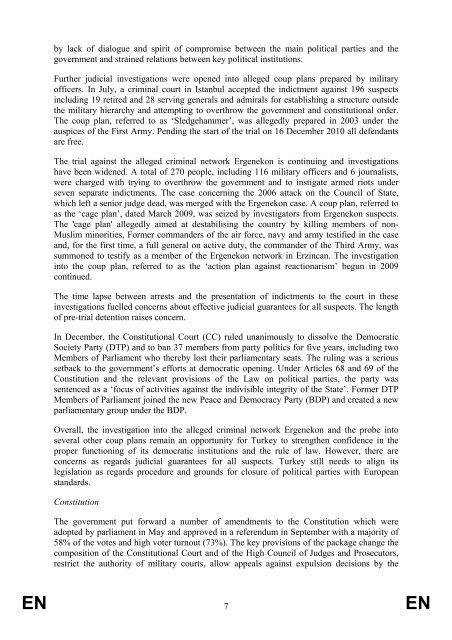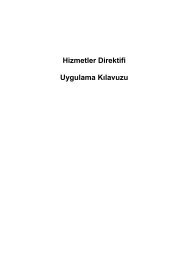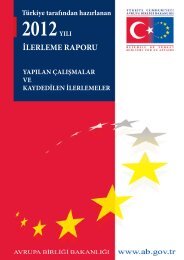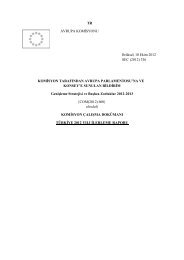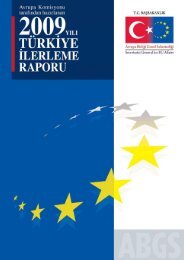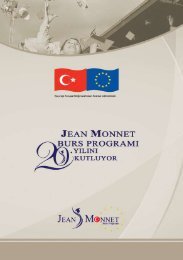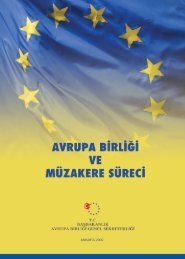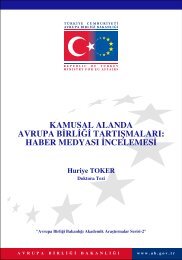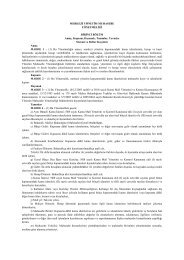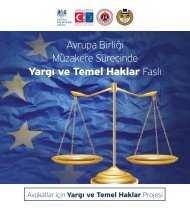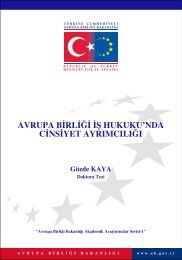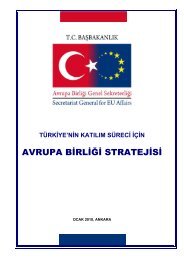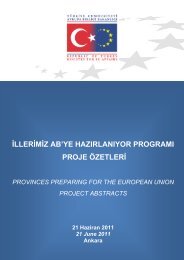2010 ilerleme raporu - Avrupa Birliği Bakanlığı
2010 ilerleme raporu - Avrupa Birliği Bakanlığı
2010 ilerleme raporu - Avrupa Birliği Bakanlığı
You also want an ePaper? Increase the reach of your titles
YUMPU automatically turns print PDFs into web optimized ePapers that Google loves.
y lack of dialogue and spirit of compromise between the main political parties and thegovernment and strained relations between key political institutions.Further judicial investigations were opened into alleged coup plans prepared by militaryofficers. In July, a criminal court in Istanbul accepted the indictment against 196 suspectsincluding 19 retired and 28 serving generals and admirals for establishing a structure outsidethe military hierarchy and attempting to overthrow the government and constitutional order.The coup plan, referred to as ‘Sledgehammer’, was allegedly prepared in 2003 under theauspices of the First Army. Pending the start of the trial on 16 December <strong>2010</strong> all defendantsare free.The trial against the alleged criminal network Ergenekon is continuing and investigationshave been widened. A total of 270 people, including 116 military officers and 6 journalists,were charged with trying to overthrow the government and to instigate armed riots underseven separate indictments. The case concerning the 2006 attack on the Council of State,which left a senior judge dead, was merged with the Ergenekon case. A coup plan, referred toas the ‘cage plan’, dated March 2009, was seized by investigators from Ergenekon suspects.The 'cage plan' allegedly aimed at destabilising the country by killing members of non-Muslim minorities, Former commanders of the air force, navy and army testified in the caseand, for the first time, a full general on active duty, the commander of the Third Army, wassummoned to testify as a member of the Ergenekon network in Erzincan. The investigationinto the coup plan, referred to as the ‘action plan against reactionarism’ begun in 2009continued.The time lapse between arrests and the presentation of indictments to the court in theseinvestigations fuelled concerns about effective judicial guarantees for all suspects. The lengthof pre-trial detention raises concern.In December, the Constitutional Court (CC) ruled unanimously to dissolve the DemocraticSociety Party (DTP) and to ban 37 members from party politics for five years, including twoMembers of Parliament who thereby lost their parliamentary seats. The ruling was a serioussetback to the government’s efforts at democratic opening. Under Articles 68 and 69 of theConstitution and the relevant provisions of the Law on political parties, the party wassentenced as a ‘focus of activities against the indivisible integrity of the State’. Former DTPMembers of Parliament joined the new Peace and Democracy Party (BDP) and created a newparliamentary group under the BDP.Overall, the investigation into the alleged criminal network Ergenekon and the probe intoseveral other coup plans remain an opportunity for Turkey to strengthen confidence in theproper functioning of its democratic institutions and the rule of law. However, there areconcerns as regards judicial guarantees for all suspects. Turkey still needs to align itslegislation as regards procedure and grounds for closure of political parties with Europeanstandards.ConstitutionThe government put forward a number of amendments to the Constitution which wereadopted by parliament in May and approved in a referendum in September with a majority of58% of the votes and high voter turnout (73%). The key provisions of the package change thecomposition of the Constitutional Court and of the High Council of Judges and Prosecutors,restrict the authority of military courts, allow appeals against expulsion decisions by theEN 7 EN


